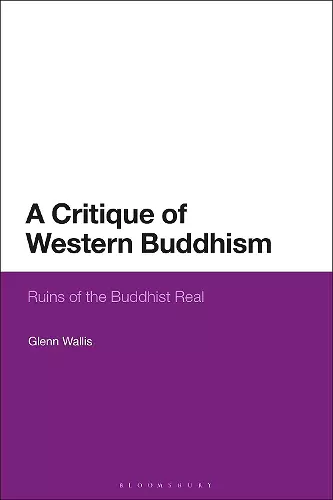A Critique of Western Buddhism
Ruins of the Buddhist Real
Format:Paperback
Publisher:Bloomsbury Publishing PLC
Published:19th Mar '20
Currently unavailable, and unfortunately no date known when it will be back

An innovative critique of Buddhism, which thinks through Buddhist concepts using the tools of Continental philosophy.
What are we to make of Western Buddhism? This open access book argues that in aligning their tradition with the contemporary wellness industry, Western Buddhists evade the consequences of Buddhist thought. Glenn Wallis shows that with concepts such as vanishing, nihility, extinction, contingency, and no-self, Buddhism, like all potent systems of thought, articulates a notion of the “real.” Raw, unflinching acceptance of this real is held by Buddhism to be at the very core of human “awakening.” Yet these preeminent human truths are universally shored up against in contemporary Buddhist practice, contravening the very heart of Buddhism.
The author’s critique of Western Buddhism is threefold. It is immanent, in emerging out of Buddhist thought but taking it beyond what it itself publicly concedes; negative, in employing the “democratizing” deconstructive methods of François Laruelle’s non-philosophy; and re-descriptive, in applying Laruelle’s concept of philofiction. Through applying resources of Continental philosophy to Western Buddhism, A Critique of Western Buddhism suggests a possible practice for our time, an "anthropotechnic", or religion transposed from its seductive, but misguiding, idealist haven.
The ebook editions of this book are available open access under a CC BY-NC-ND 3.0 licence on bloomsburycollections.com. Open access was funded by Knowledge Unlatched.
Having read through the book a second time I can say without hesitation that A Critique of Western Buddhism is one of the most important books ever written on the subject of Buddhism—certainly the most important in the decades since Buddhism has established itself as an ideological resident here in the West. * The Failed Buddhist *
The single most important book of contemporary Buddhist philosophic reflection. Wallis’ critique masterfully addresses the twinned questions central to contemporary Buddhism: ‘What use is being made of Buddhism today?’ and ‘What use is Buddhism today? * Richard K. Payne, Yehan Numata Professor of Japanese Buddhist Studies, Institute of Buddhist Studies, USA *
It is a very rare and precious thing to find a book such as this, which engages as deeply with religious materials as it does with the philosophical. Glenn Wallis brings together resources from Continental philosophy, namely François Laruelle’s non-philosophy, and concepts and ideas from Buddhism to carry out a A fecund project that grows in the ruins of our philosophical and religious pretensions and arrogance. * Anthony Paul Smith, Associate Professor of Philosophical Theology, La Salle University, USA *
Glenn Wallis' Critique of Western Budism is one of the rare examples of non-philosophy applied on a specific subject area, next to Anthony Paul Smith's non-philosophical environmental studies, John O'Maoilearca's animal studies as well non-Marxism. It proves that non-philosophy is praxis grounded rather than being self-sufficient system of philosophical diagnostics. Wallis’ brilliant analysis demonstrates that radicalized Buddhism establishes a perfect homology with non-philosophy, both in form and in substance. * Katerina Kolozova, Professor of Philosophy and Gender Studies, University American College, Macedonia *
Wallis' Critique is a bold commentary and analysis of Western Buddhism that runs against the mainstream. His central arguments are convincing and should certainly enter into discussions of "mindfulness" practices and adaptions of Buddhism in Western societies. This book will challenge the thinking and practice of many readers, make some uncomfortable, but will be a life preserver for others. * Stuart W Smithers, Chair of the Department of Religious Studies, University of Puget Sound, USA *
It is safe to say that this book is not for the faint-hearted. Not only does it force the reader to query with honest dedication into the depths of a vast living tradition, Buddhism, which has chunky ancient roots and innumerable
old and new branches as well; it also obliges one to come up to par with the demands of current Continental philosophy, namely, that of the non-philosophy of François Laruelle. ... Wallis’s endeavor has produced a seminal critical text that asks more profound questions and comes up with more promising answers than most of what we could find in the past half-century’s literature on Buddhism in the West.
ISBN: 9781350155213
Dimensions: unknown
Weight: 340g
232 pages